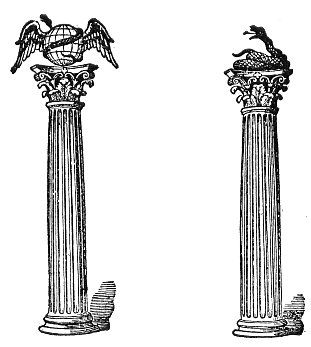But if vapor falls in water, it was held, water is again the birth of vapors, which ascend and adorn the Heavens. If our mortal existence be the death of the spirit, our death may be the renewal of its life; as physical bodies are exalted from earth to water, from water to air, from air to fire, so the man may rise into the Hero, the Hero into the God. In the course of Nature, the soul, to re-cover its lost estate, must pass through a series of trials and migrations. The scene of those trials is the Grand Sanctuary of Initiations, the world: their primary agents are the elements; and Dionusos, as Sovereign of Nature, or the sensuous world personified,
p. 519
is official Arbiter of the Mysteries, and guide of the soul, which he introduces into the body and dismisses from it. He is the Sun, that liberator of the elements, and his spiritual mediation was suggested by the same imagery which made the Zodiac the supposed path of the spirits in their descent and their return, and Cancer and Capricorn the gates through which they passed.
He was not only Creator of the World, but guardian, liberator, and Saviour of the Soul. Ushered into the world amidst lightning and thunder, he became the Liberator celebrated in the Mysteries of Thebes, delivering earth from Winter’s chain, conducting the nightly chorus of the Stars and the celestial revolution of the year. His symbolism was the inexhaustible imagery employed to fill up the stellar devices of the Zodiac: he was the Vernal Bull, the Lion, the Ram, the Autumnal Goat, the Serpent: in short, the varied Deity, the resulting manifestation personified, the all in the many, the varied year, life passing into innumerable forms; essentially inferior to none, yet changing with the seasons, and undergoing their periodical decay.
He mediates and intercedes for man, and reconciles the Universal Unseen Mind with the individualized spirit of which he is emphatically the Perfecter; a consummation which he effects, first through the vicissitudes of the elemental ordeal, the alternate fire of Summer and the showers of Winter, “the trials or test of an immortal Nature”; and secondarily and symbolically through the Mysteries. He holds not only the cup of generation, but also that of wisdom or initiation, whose influence is contrary to that of the former, causing the soul to abhor its material bonds, and to long for its return. The first was the Cup of Forgetfulness; while the second is the Urn of Aquarius, quaffed by the returning spirit, as by the returning Sun at the Winter Solstice, and emblematic of the exchange of worldly impressions for the recovered recollections of the glorious sights and enjoyments of its pre-existence. Water nourishes and purifies; and the urn from which it flows was thought worthy to be a symbol of Deity, as of the Osiris-Canobus who with living water irrigated the soil of Egypt; and also an emblem of Hope that should cheer the dwellings of the dead.
The second birth of Dionusos, like the rising of Osiris and Atys from the dead, and the raising of Khu_ru_m, is a type of the spiritual regeneration of man. Psyche (the Soul), like Ariadne, had
p. 520
two lovers, an earthly and an immortal one. The immortal suitor is Dionusos, the Eros-Phanes of the Orphici, gradually exalted by the progress of thought, out of the symbol of Sensuality into the torch-bearer of the Nuptials of the Gods; the Divine Influence which physically called the world into being, and which, awakening the soul from its Stygian trance, restores it from earth to Heaven.
Thus the scientific theories of the ancients, expounded in the Mysteries, as to the origin of the soul, its descent, its sojourn here below, and its return, were not a mere barren contemplation of the nature of the world, and of the intelligent beings existing there. They were not an idle speculation as to the order of the world, and about the soul, but a study of the means for arriving at the great object proposed, the perfecting of the soul; and, as a necessary consequence, that of morals and society. This Earth, to them, was not the Soul’s home, but its place of exile. Heaven was its home, and there was its birth-place. To it, it ought incessantly to turn its eyes. Man was not a terrestrial plant. His roots were in Heaven. The soul had lost its wings, clogged by the viscosity of matter. It would recover them when it extricated itself from matter and commenced its upward flight.

Moe is the founder of GnosticWarrior.com. He is a father, husband, author, martial arts black belt, and an expert in Gnosticism, the occult, and esotericism.





